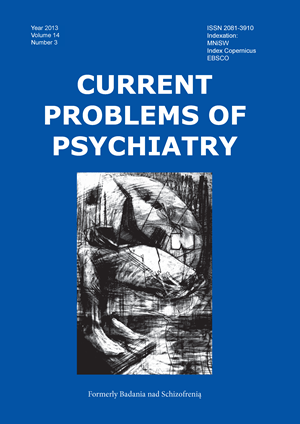What is teachers’ knowledge about diabetes?
Keywords:
teachers, diabetes, knowledge, self-esteem, attitudesAbstract
Diabetes mellitus type 1 (DM1) is one of the most often occurring chronic diseases in children. Young patients spend about a quarter of their lives at school. Therefore, care about a good metabolic control of disease may be partially dependent on the commitment and awareness of teachers.
The aim of the study was to evaluate teachers’ knowledge concerning DM and hypoglycemia. The research was conducted among 581 teachers, with the use of authorship questionnaire containing 29 closed-ended and semi-open ended questions.
Only half of respondents knew what hypoglycemia was and could point to its symptoms. Few teachers knew how to help in case of hypoglycemia, more often they were women than men. Checking of glucose level or making injections during classes was intolerable in the opinion of 12.39% of teachers. Eating during classes was a problem for 6.89% and men tended to be more restrictive. The knowledge about ways of helping children suffering from DM was very important for 94.82% of respondents. Teachers (both men and women) who suffered from DM and/or had positive family history better estimated their knowledge. Teaching children suffering from DM1 was connected with better self-esteem of knowledge concerning the disease only in the group of men.
The knowledge of teachers concerning DM is insufficient, even among those who were teaching children suffering from DM1. The poor knowledge concerned the skills and proceeding during episodes of hypoglycemia.
References
1. EURODIAB ACE Study Group. Variations and trends in incidence of childhood diabetes in Europe. Lancet 2009; 355: 873–876.
2. Sobel-Maruniak A, Grzywa M, Orłowska-Florek R, Staniszewski A. The rising incidence of type 1 diabetes in south-eastern Poland. A study of the 0–29 year-old age group, 1980–1999. Endokrynol Pol 2006; 57: 127-130.
3. Nowakowski A. Epidemiology of diabetes. Diabet Prakt 2002; 3: 181–185.
4. Boden S, Lloyd CE, Gosden C, Macdougall C, Brown N, Matyka K. The concerns of school staff in caring for children with diabetes in primary school. Pediatr Diabetes 2011; doi: 10.1111/j.1399-5448.2011.00780.x.
5. Kaufman FR, Epport K, Engilman R, Halvorson M. Neurocognitive functioning in children diagnosed with diabetes before age 10 years. J Diabetes Complications 1999; 13: 31-38.
6. Chmiel-Perzyńska I, Derkacz M, Grywalska E, Kowal A, Schabowski J, Nowakowski. The knowledge about hypoglycaemia among primary school teachers in the Lubelskie Province in Poland. Diabetol Dośw Klin 2008; 8: 157-158.
7. McCarthy AM, Lindgren S, Mengeling MA, Tsalikian E, Engvall JC. Effects of diabetes on learning in children. Pediatrics 2002; 109: E9.
8. McCarthy AM, Lindgren S, Mengeling MA, Tsalikian E, Engvall J. Factors associated with academic achievement in children with type 1 diabetes. Diabetes Care 2003; 26: 112-117.
9. Amillategui B, Mora E, Calle JR, Giralt P. Special needs of children with type 1 diabetes at primary school: perceptions from parents, children, and teachers. Pediatric Diabetes 2009; 10: 67-73.
10. American Diabetes Association. Diabetes care in the school and day care setting. Diabetes Care 2011; 34: S70-S74.
11. Schmidt C. Self-care in children with type 1 diabetes: a survey of mothers. MCN Am J Matern Child Nurs 2007; 32: 223-229.
12. Lange K, Jackson C, Deeb L. Diabetes care in schools – the disturbing facts. Pediatr Diabetes 2009; 10: 28-36.
13. Lindsey R, Jarrett L, Hillman K. Elementary schoolteachers' understanding of diabetes. Diabetes Educ 1987; 13; 312–314.
14. Klingensmith G, Kaufman F, Schatz D, Clarke W, American Diabetes Association. Care of children with diabetes in the school and day care setting. Diabetes Care 203; 26: S131-S135.
15. Davis EA, Keating B, Byrne GC, Russell M, Jones TW. Impact of improved glycaemic control on rates of hypoglycaemia in insulin dependent diabetes mellitus. Arch Dis Child 1998; 78: 111-115.
16. Aman J, Skinner TC, de Beaufort CE, Swift PG, Aanstoot HJ, Cameron F. Hvidoere Study Group on Childhood Diabetes. Associations between physical activity, sedentary behavior, and glycemic control in a large cohort of adolescents with type 1 diabetes: the Hvidoere Study Group on Childhood Diabetes. Pediatr Diabetes 2009; 10: 234-239.
17. Roberts L, Jones TW, Fournier PA. Exercise training and glycemic control in adolescents with poorly controlled type 1 diabetes mellitus. J Pediatr Endocrinol Metab 2002; 15: 621-627.


